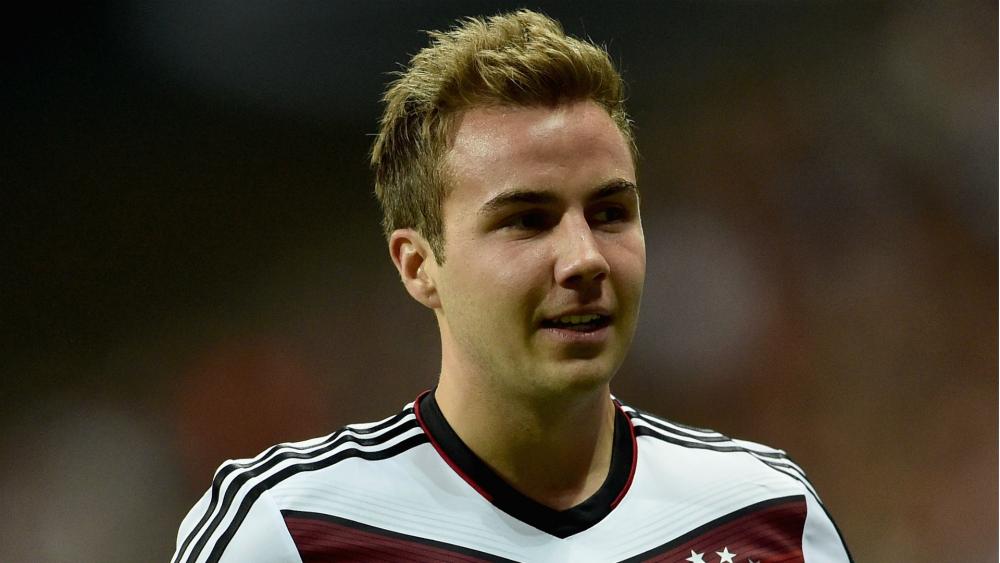FourFourTwo's 100 Greatest Footballers EVER: 60 to 51
Milan’s greatest goalscorer, Brazil’s World Cup record-breaker and the most intense kiss of the World Cup

60. Kevin Keegan
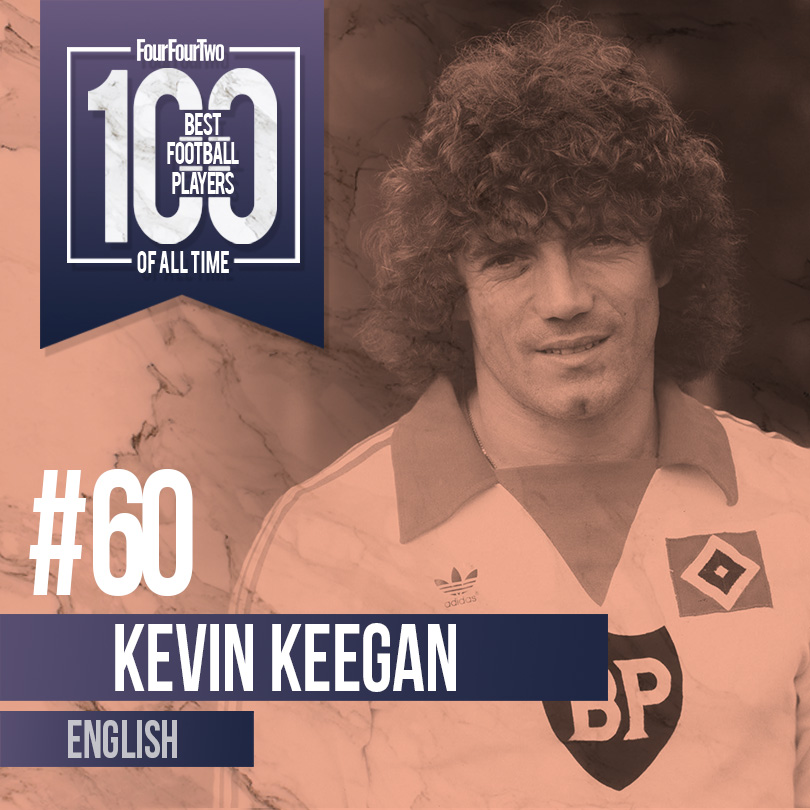
Why are they here?
‘Mighty Mouse’ became the first British sportsman to successfully embrace commercial opportunities. On the pitch, KK’s swashbuckling displays helped garner trophies for Bill Shankly’s Liverpool side in the early 1970s, including a league title and the UEFA Cup.
Under Shanks’ replacement Bob Paisley, Keegan – by now an England star - took his game to another level, helping Liverpool to their first European Cup in 1977. He moved to Hamburg to “expand my horizons” that summer, winning a Bundesliga title, plus two Ballon d’Ors in a three-year spell.
Career highlight
“Goals pay the rent, and Keegan does his share,” enthused BBC commentator David Coleman after Keegan smashed home his first goal in the 1974 FA Cup Final against Newcastle. He added the third in a comprehensive 3-0 win.
Words: Jon Spurling
59. Andres Iniesta
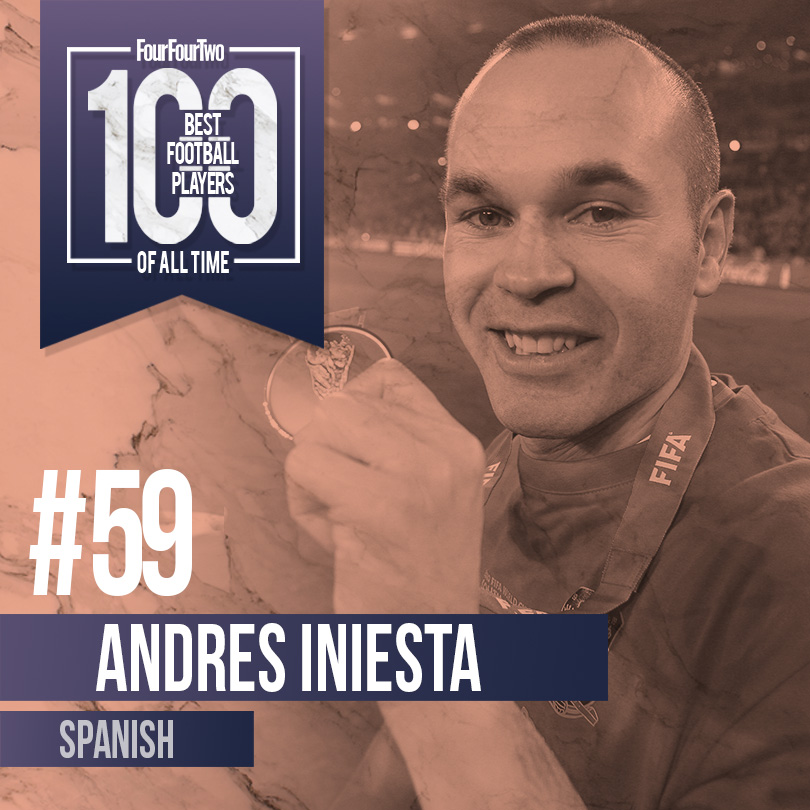
Why are they here?
Football’s modern age has given us more exciting players than Andres Iniesta, some more decisive ones and even a few more skilful ones. But precisely zero have been as gorgeously watchable.
Get FourFourTwo Newsletter
The best features, fun and footballing quizzes, straight to your inbox every week.
In a way, Iniesta can count himself unlucky to have spent his career playing in two bone fide all-time-greatest sides, at club and international level: the reverence for him would be even higher had he not been surrounded by Messi, Xavi & Co. That he has not only held his own in such company, but carved a niche as perhaps the most subtly inventive of the lot, is what he’ll have to settle for. (That, and a medal collection that is quite literally complete.)
Career highlight
Guiding home the goal that won the 2010 World Cup, a strike whose chaotic build-up was punctuated momentarily by a cigar-puffing backheel from the man himself.
Words: Alex Hess
58. Adolfo Pedernera
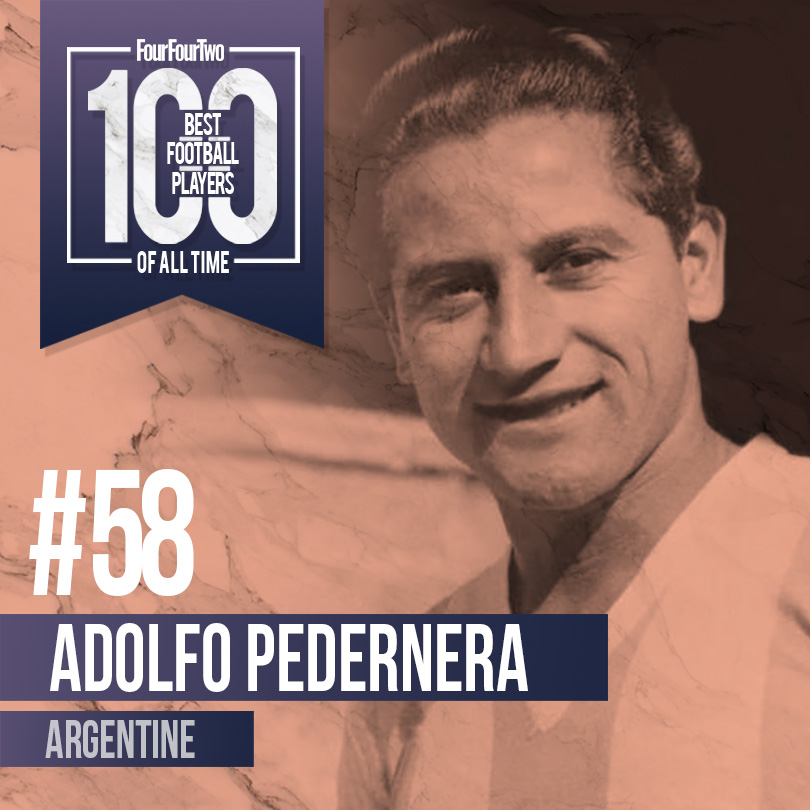
Why are they here?
Magically two footed, incredibly fast, outrageously talented technically, Pedernera was crucial to the so-called La Maquina (The Machine) – the greatest-ever River Plate team.
He was equally lethal as a centre-forward, attacking midfielder or left winger, and Alfredo Di Stefano admired him in his youth, claiming that Pedernera was his idol and the most amazing player he had ever seen. The Argentine won five championship titles and made a massive contribution off the pitch as well, leading the strike against a salary cap and moving to Colombia in order to earn more money.
Career highlight
Pedernera won the Copa America twice with Argentina, in 1941 and 1945.
Words: Michael Yokhin
57. Karl-Heinz Rummenigge
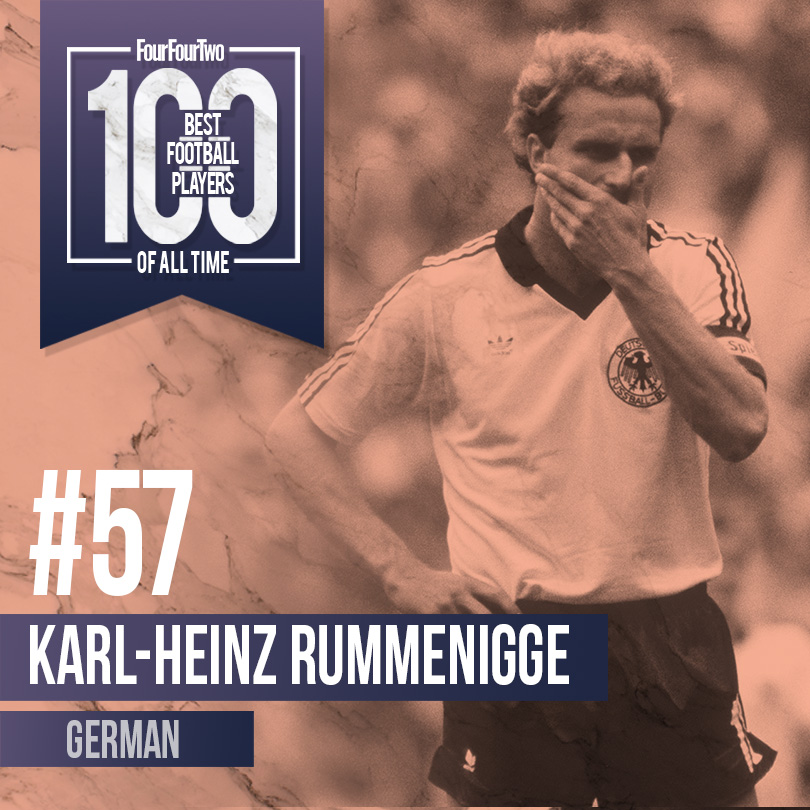
Why are they here?
An excellent dribbler who could crash in shots with virtually no backlift, the powerfully built Rummenigge was arguably the most effective forward in Europe during the late 1970s and early '80s.
His fruitful partnership with midfielder Paul Breitner (Bayern Munich were nicknamed ‘FC Breitnigge’) helped bring shedloads of silverware to Bavaria, including three European Cups in succession. Rummenigge starred on the international stage as well, winning the European Championship in 1980.
Career highlight
In the World Cup's first ever penalty shootout, Rummenigge stayed typically calm, netting his spot kick against France in an infamous semi-final to help send eventual runners-up West Germany into the final.
Words: Jon Spurling
56. Daniel Passarella
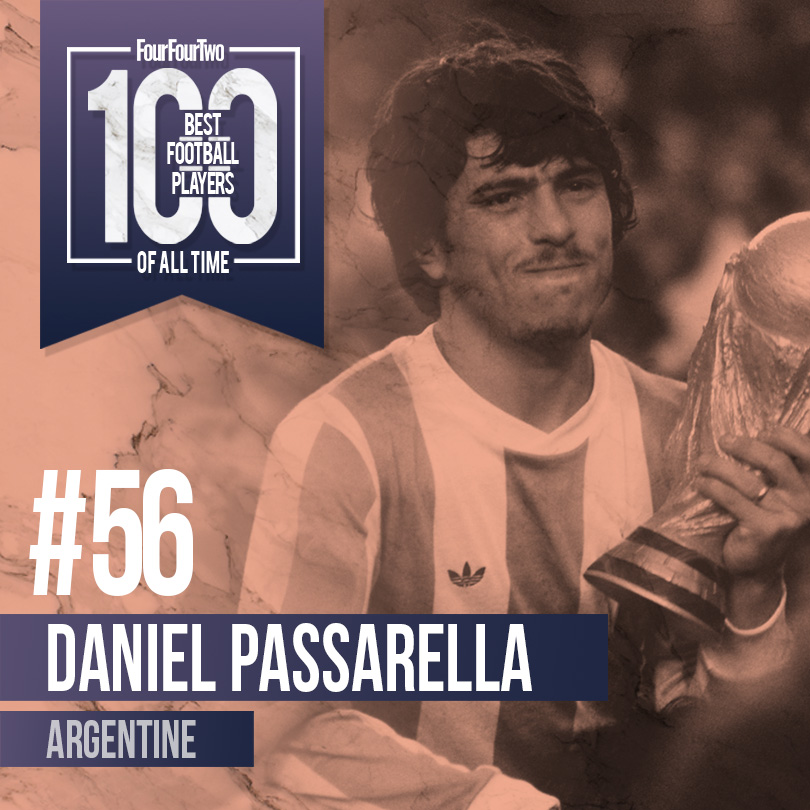
Why are they here?
Widely considered one of the best centre-backs of all time, Passarella is remembered for his range of qualities. The Argentine was a ferocious defender, strong in the tackle and extremely good positionally. His heading abilities were absolutely extraordinary given the fact that he was just 5ft 8in tall.
His attacking contribution was incredible, with 175 goals scored in all competitions. Passarella was also known for building the attacks from behind with his immaculate passing. His leadership qualities were second to none, and he was nicknamed the Great Captain. He won titles, too – six of them with River Plate before moving to play for Fiorentina and Inter in Serie A.
Career highlight
Captaining Argentina to the World Cup triumph in 1978 was the greatest feat, and it’s hugely unfortunate that Passarella missed the 1986 tournament through illness – but was still in the squad and got a second winner’s medal.
Words: Michael Yokhin
55. Dino Zoff
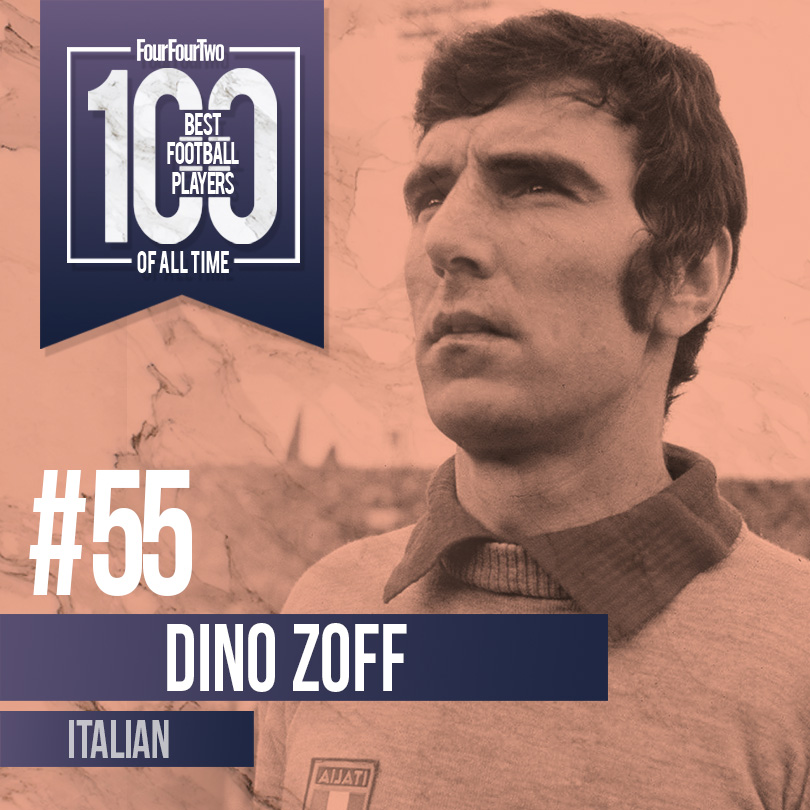
Why are they here?
The only Italy international to win both the European Championship (in 1968) and the World Cup (in 1982), goalkeeper Zoff joined Juventus at the comparatively late age of 32 – then won six Scudettos and made 330 consecutive appearances.
Known for his incredible reflexes and positional sense, Zoff played on well into his 40s. Italy manager Enzo Bearzot described the normally level-headed keeper planting a kiss on his cheek following his team's 3-2 win over Brazil in 1982 as "a fleeting moment which was the most intense of that World Cup".
Career highlight
Aged 40, Zoff became the oldest player to feature in a World Cup final, as he captained Italy to victory against West Germany in 1982.
Words: Jon Spurling
54. Gunnar Nordahl
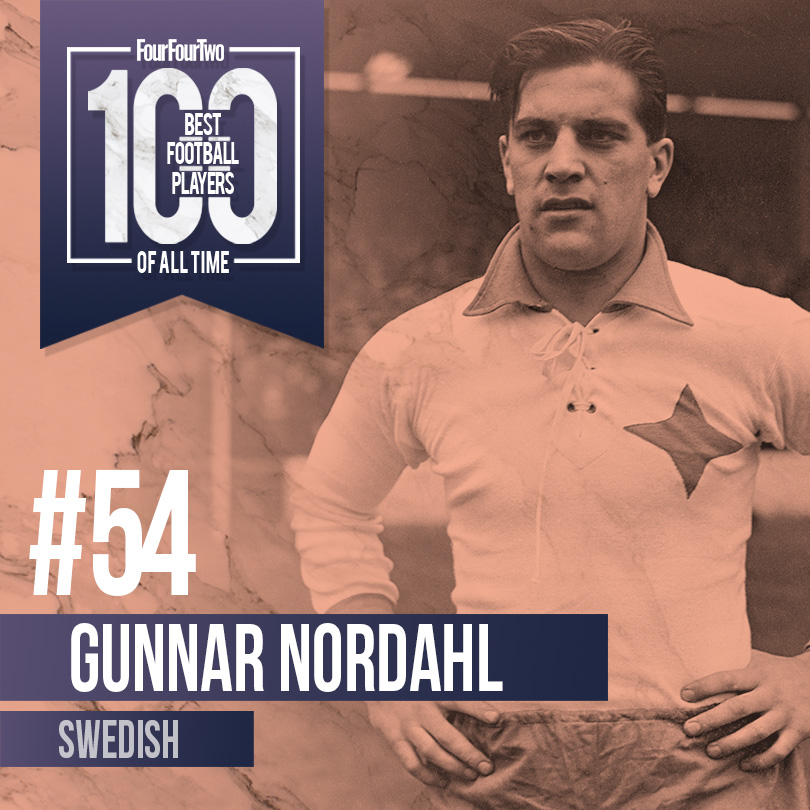
Why are they here?
With 210 Serie A goals, Nordahl is the greatest Milan scorer of all time, and nobody – not even Andriy Shevchenko – could ever come close to his achievement. The powerfully built Swede was the top scorer in Italy five times during the six-year period between 1950 and 1955 – also an unprecedented feat.
Such was his initial success that Milan signed two of his compatriots, Nils Liedholm and Gunnar Gren. Together they formed the famous Gre-No-Li partnership, one of the best footballing trios ever. Nordahl won the championship title twice with Milan and remains the top-scoring foreign player in the history of Italian football.
Career highlight
Nordahl was brilliant for his national team as well, with 43 goals in 33 games. His contribution was crucial when Sweden won gold at the 1948 Olympics.
Words: Michael Yokhin
53. Gaetano Scirea
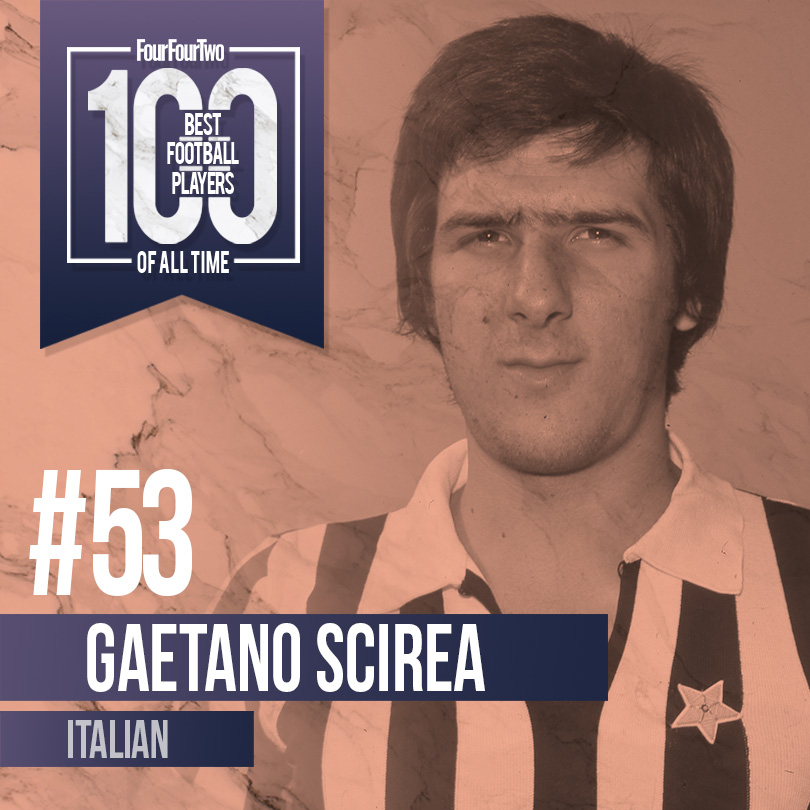
Why are they here?
A pacy and clever defender, Scirea's elegance and cerebral attitude to the game was in marked contrast to the spikier approach of Italy and Juventus team-mate Claudio Gentile.
Playing sweeper for most of his career, Scirea - whose death in a car accident at just 36 was mourned by all Italian supporters - claimed his conversion from a midfielder "helped me see the game in a way others didn't”. That was no idle boast and was borne out by the fact he won trophies by the bucketload, and remains one of only five European players to have won all international club trophies recognised by UEFA and FIFA.
Career highlight
His team-mates Dino Zoff and Paolo Rossi may have been more feted, but Scirea's impeccable performances as Italy won the 1982 World Cup were a masterclass in the art of defending.
Words: Jon Spurling
52. Roberto Baggio
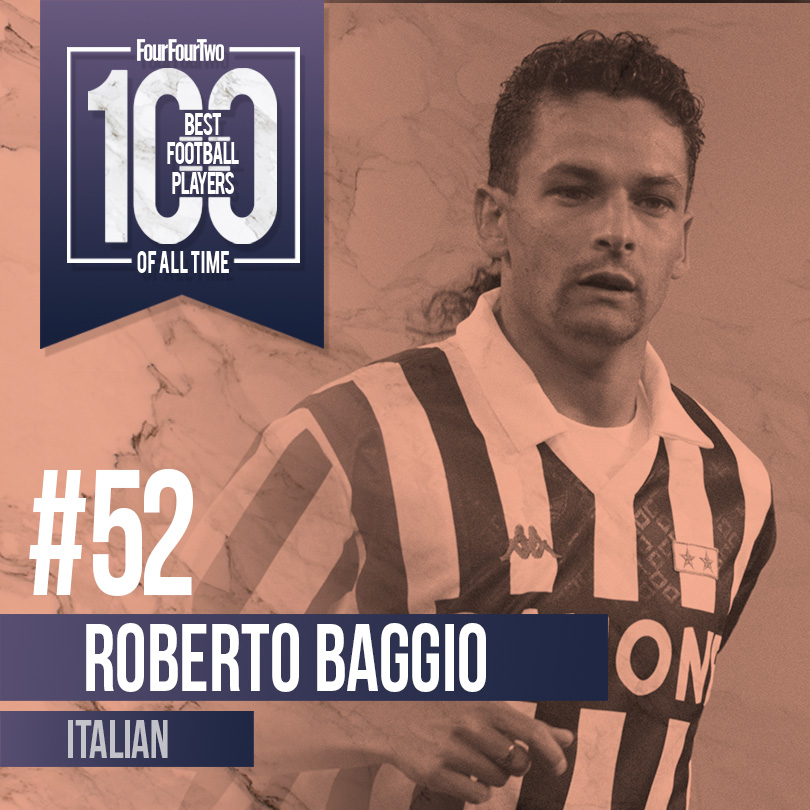
Why are they here?
A man who puts the glorious in ‘glorious failure’, and exists as definitive proof that legendary status needn’t be dependent on a bulging medal drawer. Baggio’s defining moment will always be that skied penalty at the 1994 World Cup, and yet it adds to his myth: the player whose impossible gifts were never measured by conventional means.
A two-footed No.10 who scored and created with equal glee, possessed an improbably exquisite first touch, and could plant a free-kick pretty much where he wanted, Baggio was the precursor – and an inspiration – to an explosion of similar Italian players in the mid-90s, notably Gianfranco Zola and Alessandro Del Piero.
Career highlight
The 1993 Ballon d’Or winner claimed a comparatively meagre four major trophies in his career, but his league and cup double with Juventus in 1995 included his first league title and went some way to banishing the demons of 12 months earlier.
Words: Alex Hess
51. Jairzinho
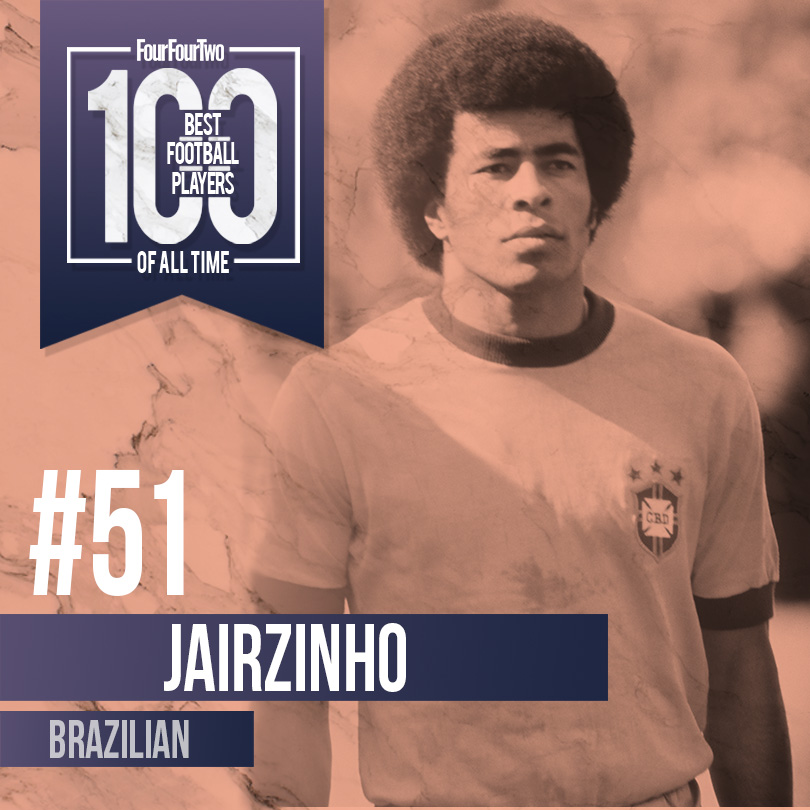
Why are they here?
His devastating bursts of speed and lethal shooting secured him a place in history after the 1970 World Cup. That Brazil side inspired a generation of footballers and had in Jairzinho one of their biggest stars, despite him being relegated to the outside positions by Pele and Tostao.
He’s still the only player to have won the World Cup while scoring in every game in the tournament. If it wasn’t enough, the former winger would later show an eye for talentspotting, taking a then-skinny Ronaldo to Cruzeiro and recommending him to the Brazil youth team.
Career highlight
His winner against reigning champions England was one of the 1970 World Cup’s most memorable goals.
Words: Marcus Alves
The list
100 to 91 • 90 to 81 • 80 to 71 • 70 to 61 • 60 to 51 • 50 to 41 • 40 to 31 • 30 to 21
20 • 19 • 18 • 17 • 16 • 15 • 14 • 13 • 12 • 11 • 10 • 9 • 8 • 7 • 6 • 5 • 4 • 3 • 2 • 1
Alex Reid is a freelance journalist and the former digital features editor at FourFourTwo. He has also written for the Guardian, talkSPORT, Boxing News and Sport magazine. Like most Londoners, he is a lifelong supporter of Aberdeen FC. He is deceptively bad in the air for a big man. He has never been a cage fighter.

